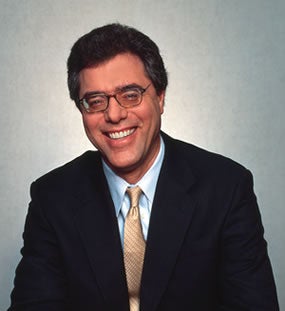A conversation with Steven R. Shapiro ’75
Steven R. Shapiro ’75 has been legal director of the American Civil Liberties Union since 1993 and leads a staff of more than 90 lawyers. He has contributed to more than 200 U.S. Supreme Court briefs and has worked on a range of issues and cases, from Reno v. ACLU, the first major ruling on the regulation of materials distributed over the Internet, in which the Court ruled that the federal Communications Decency Act was an unconstitutional restriction on free speech, to Arizona v. United States, in which the Court this June struck down three of four immigration-enforcement provisions of Arizona’s S.B. 1070.
HLS spoke with Shapiro about his time at the 92-year-old ACLU and his take on the state of freedom in the U.S.
What are the most pressing civil liberties issues facing our country?
Government surveillance. The lack of any accountability for torture and human-rights abuses. Race is always an issue in this country, and the economic difficulties we are dealing with accentuate the schism. Immigration. An assault on women and reproductive rights that would have been unimaginable a decade ago. Technological advances and the threat to our privacy.
You grew up in a middle-class New York family with civil servant parents. How did you relate your own reality to those who were marginalized?
My first vivid political memory is the 1960 presidential campaign and Kennedy’s election. That is coupled in my memory with the civil rights movement: The Selma march, the March on Washington, the Freedom Riders … the passage of the 1964 Civil Rights Act and the 1965 Voting Rights Act, the assassinations of John Kennedy, Robert Kennedy, and Martin Luther King—they left a deep and lasting impression on me. They also left me with the belief that law and lawyers could be a force for progressive change. It’s not only white adult males who are entitled to rights: Women, lesbian and gay and transgender people, children, prisoners—they all have rights. We all have rights by virtue of being human beings.
How do you deal with frustration when the judicial and political winds don’t blow the way of civil liberties?
I do think patience is a function of working at an organization that parallels almost precisely the history of individual rights in this country. Until the early 20th century there was no conception that the rights identified in the Bill of Rights were judicially enforceable. If you take the long view, you can say over time that we are moving in the right direction.
What case gave you the most heartburn?
The work we have done [related to the aftermath of 9/11] has often been stressful because the issues are so fundamental and the stakes are so high.
How did you feel as a native New Yorker working on civil liberties post-9/11?
I’m very proud of the way the organization responded to the civil liberties threats that followed 9/11. The issues we were debating truly brought us back to first principles in a way that very few other things do. For somebody whose office was a mile away from ground zero, I never diminished the magnitude of what happened or the seriousness of the threat we faced after. The national security issues were real. But at the end of the day, our national security depends on allegiance to principles that define us as a nation.
“This is a conservative Supreme Court, but the issues they address are complicated. It’s misleading to try to pigeonhole them.”
Steven R. Shapiro ’75
What’s your take on the current Supreme Court?
This is a conservative Supreme Court, but the issues they address are complicated, and it’s misleading to try to pigeonhole them. All we have to do is look at the health care case. It’s undeniably true that the federal courts have gotten more conservative over the course of my lifetime; on the other hand, you can’t do this kind of work unless you believe the arc of history bends toward freedom.
What has changed since you began at the ACLU that you could not have predicted?
The quality of political and public discussion has declined.
What’s the solution?
What the solution always is in a democracy: The people who have the capacity to vote need to vote. We get the democracy we deserve.
If you had the ear of the general U.S. populace, what would you say about civil liberties?
Rights are fragile and can be lost if we do not fight to maintain them.
